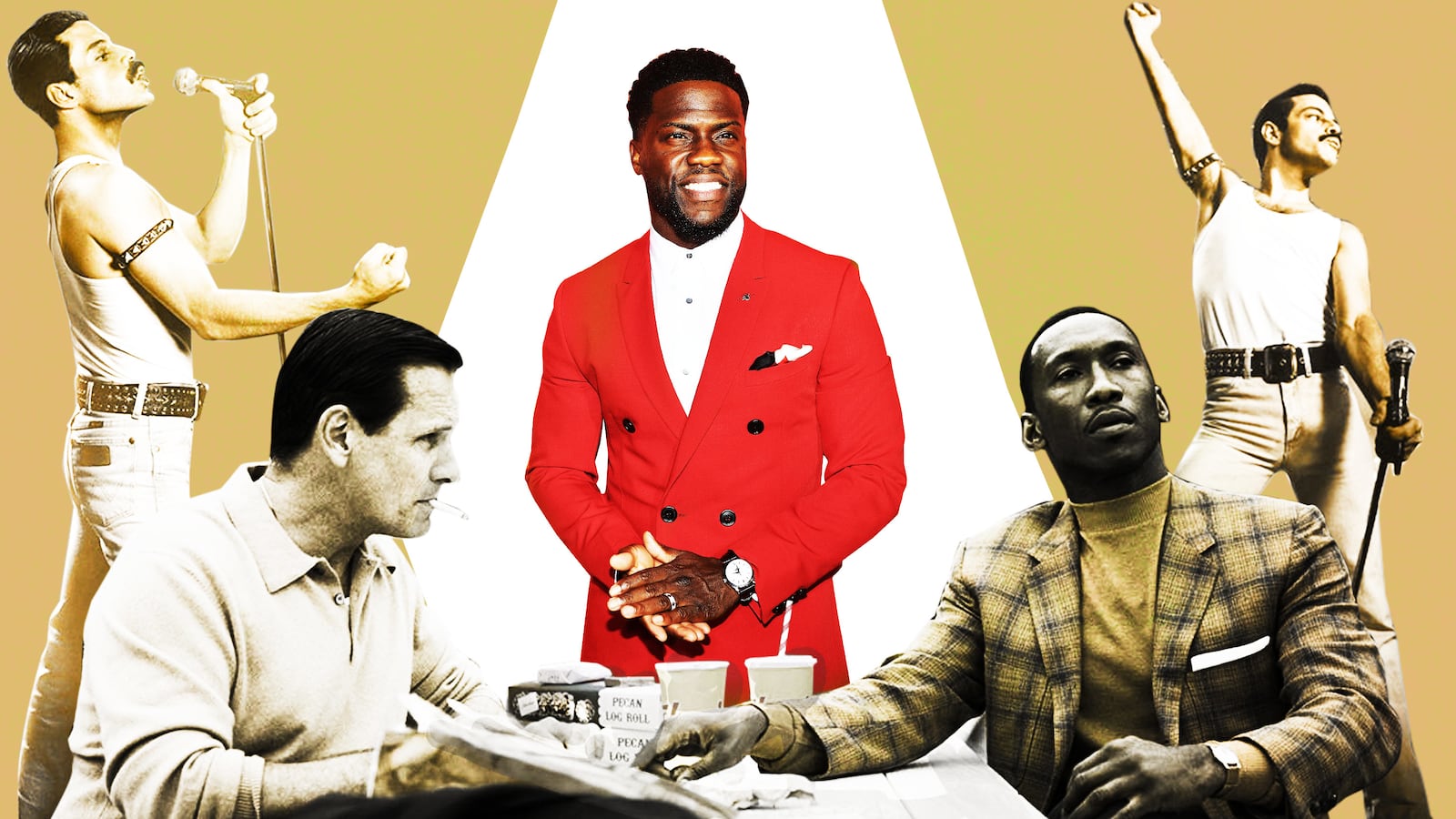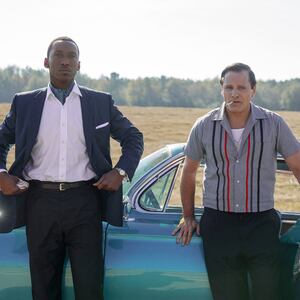Kevin: The lead-up to the Oscars thus far has been a garbage fire that members of the Academy and producers keep getting caught pouring more kerosene on. So it’s easy to forget that there are actual films to be debated and awards to be handed out. Lucky for those films, because they’ve been pretty controversial, too. I don’t know if it’s because we’re in the age of social media, the era of splintered opinion, or just surrounded by bad taste, but this year’s nominees are pretty wild, right?
Marlow: Pretty wild like an Alexis Neiers voicemail message to Nancy Jo.
Kevin: Talking about this year’s biggest controversies, it’s hard to know where to begin. So let’s just start with Bohemian Rhapsody. It’s so great that a popular movie snagged a Best Picture nod, especially in a year when the Academy was self-conscious enough that it floated that insane Best Popular Movie idea. What’s crazy to me, though, is that people actually think this is a good movie.
Marlow: When it’s so not!
Kevin: The controversies are endless, though it’s been my experience that fans do not want to hear about the factual liberties that were taken, the homophobic way in which Freddie Mercury’s sexuality was portrayed, or the mean-spirited nature of the film’s treatment of his legacy. Maybe they do want to hear about the fact that in 2019, a Best Picture nominee had to fire a director for bad behavior, and that director happens to be Bryan Singer, who is also accused of multiple instances of sexual misconduct. Throughout the entire batshit awards campaign, those involved with the movie have basically acted like the movie was directed by no one, and haven’t directly or satisfyingly addressed Singer’s behavior or the allegations against him. But even if an awards voter could excuse all that, there’s the harsh truth that the movie is a) incredibly boring before that Live Aid finale, and b) one of the worst-edited films I’ve seen this year. Look at this tweet if you need a reminder:
Marlow: Even by humdrum biopic standards it isn’t very good. People are treating it like Amadeus when it’s more akin to Beyond the Sea, the vapid and chemistry-less Bobby Darin biopic starring Kevin Spacey (a Singer pal, collaborator, and fellow accused sexual predator, as it were). It’s sloppily edited, poorly acted (save Malek), and contains more music-biopic clichés than Walk Hard. But we really should address the factual liberties that were taken, because it’s far and away the most tasteless and repulsive thing done in any major film this year: Yes, the makers of Bohemian Rhapsody had the gall to change Freddie Mercury’s AIDS diagnosis to suit their fictional narrative, transforming his legendary 1985 Live Aid performance into something else entirely (he was said to be diagnosed well after, in ‘87). I’m still appalled by this.
Kevin: I’d go so far as to say that even Malek has been overrated, but that’s for a different debate!
Marlow: Those distracting fake chompers! But we can’t spend all day on the whole Bohemian mess. People have also taken umbrage with Green Book, the Peter Farrelly race-relations drama starring Viggo Mortensen and Mahershala Ali—or what comedian Roy Wood Jr. called the story of the “first racist Uber driver.”
Kevin: Which controversy should we start on: That the white lead of a feel-good movie about race relations used the N-word and didn’t understand why that was wrong? That it is such an anodyne portrayal of the civil-rights era that white reviewers mistook the utopia for fact? That the family of the film’s subject has contended that most of the movie is a lie? That it is a 99-percent white team of people, save Octavia Spencer, who are telling this bastardized story? That the writer of a movie about racial understanding once tweeted with Donald Trump about Islamophobic 9/11 conspiracies? That the director admitted flashing his penis to actresses? Or... that this movie is a very, very bad movie and yet somehow also a Best Picture frontrunner?
Marlow: And 30 years after the release of the retrograde Driving Miss Daisy, which somehow won Best Picture in a year where Do the Right Thing wasn’t even nominated. Where’s the shame, shame, shame bell lady when you really need her? I actually didn’t think Green Book was that terrible, though definitely a bit saccharine, and definitely misguided in its approach, framing it as Tony Lip’s tale of racial redemption whilst using a black artistic genius, Don Shirley, as the conduit. Don Shirley deserved his own story, told through his eyes; a film like this preceding that is not right. That being said, it very well may win Best Picture, and that’s frustrating in a year that saw such superior fare, from Roma to The Favourite to Eighth Grade (deserving of way more Oscar love).
Kevin: It’s crazy that this is the 20th anniversary of Shakespeare in Love winning Best Picture, ushering in an era of smear-campaigning and award-ending publicizing of controversies, and a movie with as many controversies as Green Book has weathered might still win the big award.
Marlow: Harvey Weinstein: Good riddance. People forget that the guy’s relentless bullying gave us some of the most undeserving Best Picture winners in recent memory, like Shakespeare in Love, Chicago, The King’s Speech, etc. Anyway, enough about that creep. We’ve already aired our grievances with Adam McKay’s Dick Cheney biopic Vice, a very bad film that somehow received eight Oscar nominations. But... the ceremony doesn’t even have a host!
Kevin: We will address your Chicago slander at a later date. On the topic at hand: I am always railing against the unnecessary bits in an Oscars telecast that distract from the task of awarding the films, but I still concede that the host and especially the opening monologue are the most memorable part of any telecast. As the Oscars has become, in many ways, a referendum on where we are as a society, the monologue hasn’t just been entertainment, but important in distilling the ways pop culture influences culture at that time. So it’s lame that there isn’t a host this year. But—and because of how he handled the controversy perhaps more than the circumstances of the controversy itself—I’m glad it’s not Kevin Hart.
Marlow: I’m not sure the public is aware of just how many homophobic “jokes” (if you could call them that) and/or comments there were on Kevin Hart’s Twitter. This narrative that there were just a few bad cracks is bunk—there were literally hundreds. And the Academy gave him the simple choice of issuing an apology or stepping down, and he chose the latter. Who refuses to apologize for issuing hundreds of homophobic remarks? But there are several other funny people who could’ve hosted this. I would’ve sprung for the Steves (Carell and Colbert), who go back decades, having worked together at Second City, on The Dana Carvey Show and The Daily Show, and have unbelievable chemistry. But alas, we are host-less for the first time in 30 years. What a goddamn trainwreck.
Kevin: I recognize that the job of a host is thankless—which is why I admire the fine work done by emcees like Ellen DeGeneres, Hugh Jackman, and Jimmy Kimmel all the more—but that’s why the one change the Academy should make to its traditions is to no longer mandate that a host has to be extremely famous. If the insistence is treating the Oscars as an entertainment telecast, then why not take advantage of that and make it actually entertaining? Hire a second- or even third-tier performer who wants the platform and could actually use it. They’d turn the telecast into something it hasn’t been in a while: Exciting, inventive, provocative, and even must-watch. Rule changes don’t make a 91-year-old ceremony exciting. People do.









